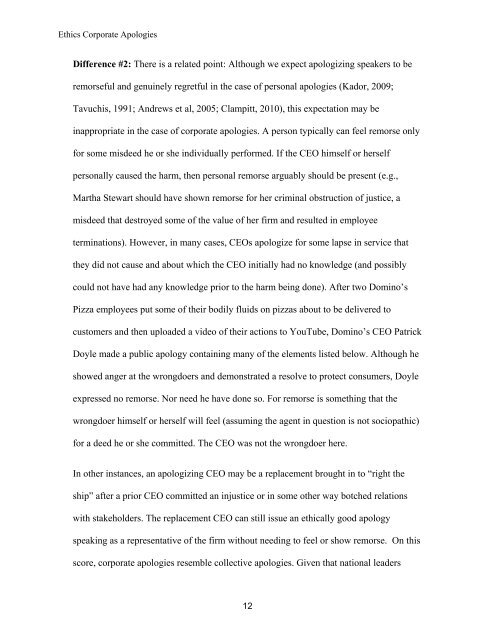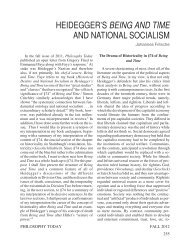Why Saying “I'm Sorry” Isn't Good Enough: The Ethics of Corporate ...
Why Saying “I'm Sorry” Isn't Good Enough: The Ethics of Corporate ...
Why Saying “I'm Sorry” Isn't Good Enough: The Ethics of Corporate ...
Create successful ePaper yourself
Turn your PDF publications into a flip-book with our unique Google optimized e-Paper software.
<strong>Ethics</strong> <strong>Corporate</strong> Apologies<br />
Difference #2: <strong>The</strong>re is a related point: Although we expect apologizing speakers to be<br />
remorseful and genuinely regretful in the case <strong>of</strong> personal apologies (Kador, 2009;<br />
Tavuchis, 1991; Andrews et al, 2005; Clampitt, 2010), this expectation may be<br />
inappropriate in the case <strong>of</strong> corporate apologies. A person typically can feel remorse only<br />
for some misdeed he or she individually performed. If the CEO himself or herself<br />
personally caused the harm, then personal remorse arguably should be present (e.g.,<br />
Martha Stewart should have shown remorse for her criminal obstruction <strong>of</strong> justice, a<br />
misdeed that destroyed some <strong>of</strong> the value <strong>of</strong> her firm and resulted in employee<br />
terminations). However, in many cases, CEOs apologize for some lapse in service that<br />
they did not cause and about which the CEO initially had no knowledge (and possibly<br />
could not have had any knowledge prior to the harm being done). After two Domino’s<br />
Pizza employees put some <strong>of</strong> their bodily fluids on pizzas about to be delivered to<br />
customers and then uploaded a video <strong>of</strong> their actions to YouTube, Domino’s CEO Patrick<br />
Doyle made a public apology containing many <strong>of</strong> the elements listed below. Although he<br />
showed anger at the wrongdoers and demonstrated a resolve to protect consumers, Doyle<br />
expressed no remorse. Nor need he have done so. For remorse is something that the<br />
wrongdoer himself or herself will feel (assuming the agent in question is not sociopathic)<br />
for a deed he or she committed. <strong>The</strong> CEO was not the wrongdoer here.<br />
In other instances, an apologizing CEO may be a replacement brought in to “right the<br />
ship” after a prior CEO committed an injustice or in some other way botched relations<br />
with stakeholders. <strong>The</strong> replacement CEO can still issue an ethically good apology<br />
speaking as a representative <strong>of</strong> the firm without needing to feel or show remorse. On this<br />
score, corporate apologies resemble collective apologies. Given that national leaders<br />
12

















